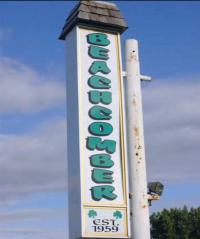September 3, 2015
 Since 1959, the Beachcomber on Quincy Shore Drive has been a watering hole for patrons and the stage for some of the best traditional Irish and Irish American bands and solo artists. The news that the club has been sold and will close its doors for good at the end of September marks the end of an era for live music in and around Boston.
Since 1959, the Beachcomber on Quincy Shore Drive has been a watering hole for patrons and the stage for some of the best traditional Irish and Irish American bands and solo artists. The news that the club has been sold and will close its doors for good at the end of September marks the end of an era for live music in and around Boston.
With the recent closing of T.T. the Bear’s, in Cambridge, and the announcement that Johnny D’s, in Somerville, will depart the music scene in early 2016 after a 46-year run, up-and-coming Irish singers and musicians will no longer have three venerable stages to use as career launching pads./
The Beachcomber’s saga began in 1959, when Jimmy McGettrick opened the club with co-owner Fred Crowley. McGettrick’s opening stake was money that he had earned by selling Christmas trees, and the price to buy the Beachcomber was $25,000. McGettrick, who bought out Crowley in 1965, was 25 when they opened the club – fittingly – on March 17, 1959. After the purchase costs, the two partners had only $285 left to stock the bar.
When he passed away in 2011 after battling brain cancer, McGettrick’s sons, Sean and Patrick, stepped in to run the club. In July, they announced that they had sold the Beachcomber to a developer who plans to tear down the building and replace it with an upscale restaurant. For countless patrons over the decades, however, there is no replacing the club and the memories of the bands and singers who raised the proverbial roof along Wollaston Beach.
Throughout the years, McGettrick booked an eclectic, musical hall of fame that included Louis Armstrong, Benny Goodman, Rosemary Clooney, Duke Tony Bennett, Norm Crosby, Johnny Mathis, Steve Lawrence, Loretta Lynn, Count Basie, Bobby Darin, and Eydie Gorme for one generation. A singer with a captivating style stunned audiences there with her range and ability to sing everything from pop to rock. Her name? Linda Ronstadt. Although the club was renamed “Nostalgia” from the early ‘80s to the late ‘90s, it was always the Beachcomber to patrons in the same way that the “Garden” is the only name for the Bruins’ and Celtics’ abode.
McGettrick’s knack for adapting to the musical tastes of several generations brought rock, r & b, punk, and any number of genres for younger crowds. An up-and-coming comic named Jay Leno performed many times at the club.
No matter how many other styles of music hit the stage at the Beachcomber, McGettrick never lost sight of his true love for Irish music, both traditional and new. The traditional Irish music scene thrived at the Beachcomber from beginning to its imminent end. From the Wolfe Tones and the Olde Brigade to The Prodigals, Black 47, and Dropkick Murphys, the Beachcomber was constantly filled with both the tears and the cheers that the various incarnations of Irish music conjure or tear from audiences. Always, Jim McGettrick made a place for Irish music, from the club’s near-legendary St. Patrick’s Day celebrations to its Irish music Sundays.
Not surprisingly, several of his favorite and perennially booked performers were talented local Irish Americans. In a 2009 interview with well-known Patriot Ledger music critic Jay Miller, McGettrick said that his “all-time favorites were locals, men and women who didn’t just stop at the Beachcomber; they came back again and again. People like Paul O’Donnell, a comic from Merrymount in Quincy, and Sid Walsh, ‘a singer with an Al Jolson-kind of voice...known as Mr. Beachcomber.”
McGettrick told Miller that Walsh would “come on in the middle of those eight-act shows and start with ‘Southie is my Hometown,’ and finish with ‘God Bless America,’ and knock it out of the park.”
The nickname “Mr. Beachcomber” could well be applied to Jimmy McGettrick, too. His reputation for treating performers with respect and fairness was well known. Carla Ryder, who played the Beachcomber with the band Mudhens, reflected to James Reed, of the Boston Globe: “I think people have a deep respect for that place [the Beachcomber], and they have a reputation of treating their artists supremely well. It’s a venerable old Boston institution that feels very down-home. It feels horrible to me that all these Boston clubs that are closing are the classic old ones.”
For many locals, the loss of the Beachcomber’s Irish Sundays and St. Patrick’s Day revels will soon be plaintive memories.

